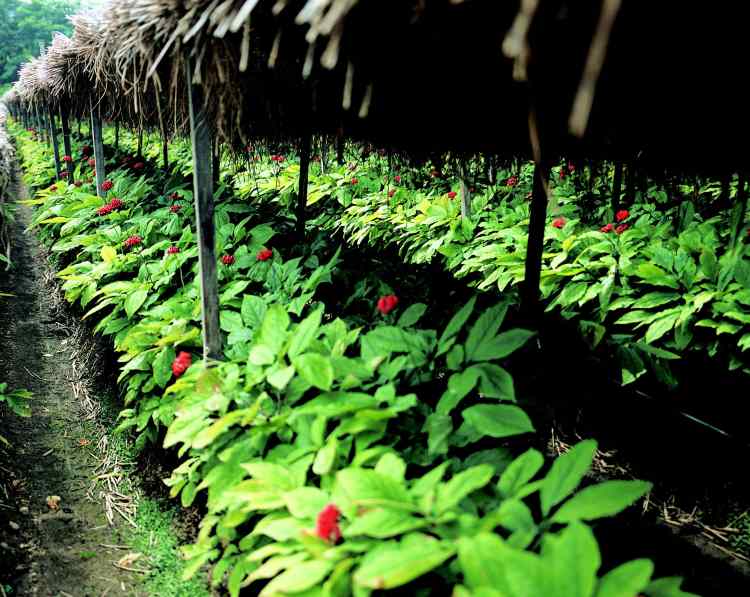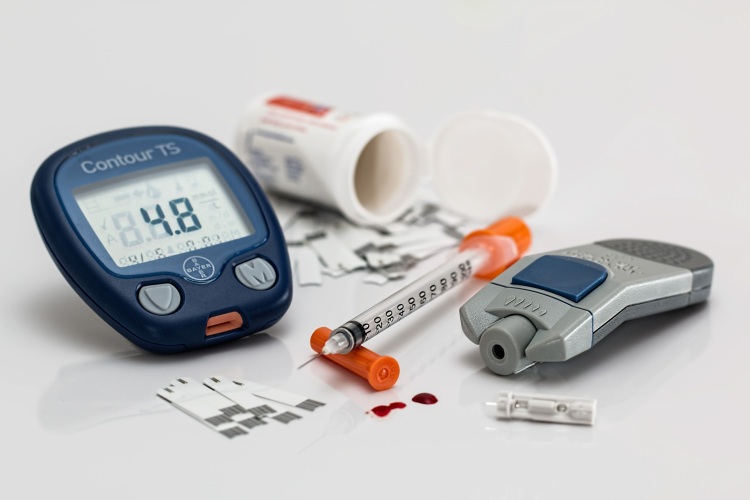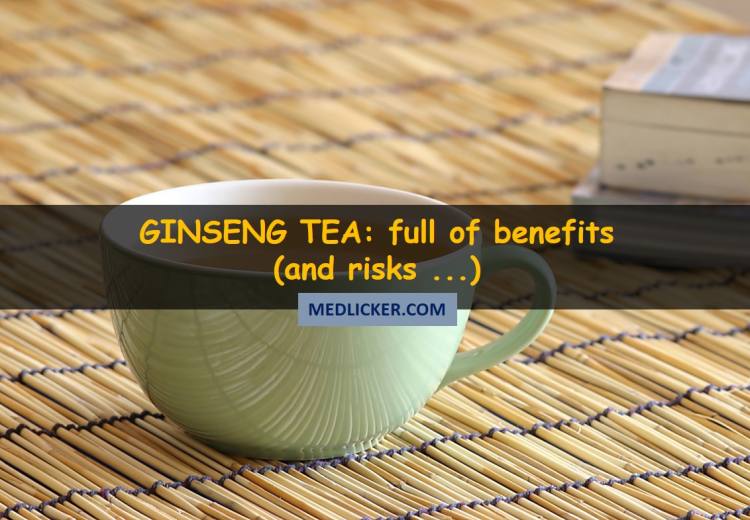10 Benefits and 6 Adverse Effects of Ginseng Tea
Ginseng tea has many health benefits for diabetes, heart, sexual health, brain, etc. It is also full of antioxidants. This posts features a detailed description of positive properties of ginseng tea, its side effects, ways how to make it, nutritional values and a little something about its history.
Ginseng tea
Ginseng tea is derived from the ginseng plant (1). It belongs to one of the eleven slow-growing perennial plants having fleshy roots and they belong to the genus Panax of the family Araliaceae.
This plant is mainly found in Eastern Asia and North America and other cooler regions.

The southernmost known ginseng is Panax Vietamensis.
These are adaptogenic herbs.
Two important chemical constituents present in ginseng are gintonin and ginsenosides.
Siberian ginseng also belongs to the same family but it isn’t a true ginseng. It is also an adaptogenic herb like ginseng. The active constituents in Siberian ginseng are eleutherosides. It has a woody root instead of a fleshy root.
Description
Ginseng is usually grown on moist and shaded mountains in Korea, Russia and China. It is a perennial herb with height of two or more feet and the thing which makes it unique are its red clusters and green leaves. The root of the plant is considered special due its medical properties. The root is quite long and resembles the shape of a human body.
Some Asian legends claim that this root has magical powers and only some lucky people can find and afford it. The roots which resemble closely to the human body are considered the most precious.
Ginseng is one of the most expensive herbs in history and it has high demand in China and Far East countries for centuries. Many wars have been fought in Asia in the regions where it grows. Wild ginseng is nearly extinct from many regions.
The wild Korean ginseng has recently been put on auction in China and New York with amount approaching $50,000.
Much of the world’s supply of ginseng is cultivated by farmers in Korea and China.
There are a number of herbs which are sold under the name of ginseng, so a person may get a bit confused.
The Chinese herbalists consider Siberian and American herbs as different herbs from Korean ginseng and they have healing effects on the human body. There are eight herbs in China which are mostly confused as ginseng which include purple ginseng, black ginseng and prince’s ginseng.
So consumers need to beware of these false ginseng products.
Taxonomy
The English word “Ginseng” has been derived from the Chinses word ‘renshen’. Ren means ‘person’ and shen means ‘plant root’ (1). This refers to the root’s shape which resembles the legs of a person. The English pronunciation is derived from Southern Chinese reading like ‘yun sum’ and ‘jin-sim’.
The genus name Panax is derived from Greek language and means “all-heal”. It is named as such because of the use of the herb as a smooth muscle relaxant (2, 3).
Nearly 80,000 tons of ginseng international commerce was produced in 2010 in four countries which are China, Canada, South Korea and the United States. The ginseng products were marketed in 35 different countries. The sales exceeded $2.1 billion and half of them were obtained from South Korea. Korea is the largest producer of ginseng and China is the largest consumer (4).
Ginseng classification
The following is a list of the classification of ginseng:
1. Red Ginseng
The red ginseng is a modified form of Panax ginseng. First it is peeled, then passed through streaming at standard boiling temperature of 100 degree C and then sun dried. It is then placed in a herbal brew which makes it brittle.
2. White Ginseng
White ginseng is present in America. It is a fresh ginseng which has been dried without heating. It is dried to reduce the amount of water in it by 12%. The white ginseng which has been dried in the sun contains less therapeutic constituents.
3. Fresh Ginseng
Fresh ginseng is the raw product which is available in limited areas.
4. Wild Ginseng
Wild ginseng is found naturally and harvested from where it is found. It is quite rare and endangered due to its high demand.
This is the reason why farmers are growing wild ginseng by new and faster methods. Wild ginseng can either be American or Asian and can be processed to make red ginseng.
History
Now let us look at some historical background of ginseng. Ginseng was used as a herbal medicine in ancient China. There are many written records about its medicinal properties which date back to 100 A.D. Traditional Chinese medical literature provides a good insight to this herb. Scientific researches on ginseng are mainly done to confirm its traditional uses.
Ginseng was first used by the Chinese people around 500 B.C. to about 200 B.C. A famous Chinese herbalist named Shennong Bencao Jing wrote the following words about ginseng (5):
"Ginseng is sweet and a bit cold. It is an addition to the five viscera. It quiets the essential spirit and corporeal souls, opens the heart and sharpen the wits. It can make the body light and give long life."
The other name for it is renxian. Another name is guigai. It is mostly grown in valleys and mountains.
Ginseng was also used by Western people.
Initially the main use of ginseng in the west was for the severely ill people.
The ginseng which the Emperors and their families used was the wild Manchurian ginseng. The market ginseng had cultivated roots and substitute roots of codonopsis.
The researchers thought that all the market samples of ginseng were worthless. But later they changed their views when they researched this herb in detail (6).
Substances present in ginseng tea
There are many active substances present in ginseng tea which have been mentioned below (7, 8, 9):
1. Ginsenosides
Gensenosides is a specific group of saponins with wide effects. This substance can penetrate into the cells which is one of its defining properties (11).
2. Panaxosides
The genus Panax contains about 182 different panaxosides. There are about 50 panaxosides in the root of ginseng. Panaxosidu belongs natural product steroid glycosides (10, 11). There have been reports that this substance has beneficial effects on the central nervous system and the cardiovascular system. Some studies have also claimed that panaxosidu has antioxidant properties.
3. Spices
The main spices used in ginseng tea are cinnamon spice and apple juice or cider. Sugar or honey can be used as a sweetener.
Nutritional value of ginseng tea
A good quality ginseng contains many chemical compounds and complex carbohydrates. But not all of them are tested (11).
Saffron is present in ginseng tea which affects our bodies just like sugar; this is why drinking ginseng tea makes a person energetic.
It has an affect like insulin and stimulates the nervous system.
The panaquilon present in ginseng affects our endocrine system and the volatile oils in ginseng stimulate specific centers in our brain (12).
The effect of natural steroids in ginseng is just like the effect of sex hormones (13).
The following table will give you a better idea of the chemical constituents of ginseng tea:
| Serving Size: 8 fl oz, 240 ml, 0.3 can |
|
| Amount per serving | Calories from fat 0 |
| Total fat: 0 g | 0 % |
| Saturated fat: 0 g | 0 % |
| Trans fat: 0 g | 0 % |
| Polyunsaturated fat: 0 g | 0 % |
| Monounsaturated fat: 0 g | 0 % |
| Cholesterol: 0 mg | 0 % |
| Sodium: 20 mg | 1 % |
| Total carbohydrates: 18 g | 6 % |
| Dietary fiber: 0 g | 0 % |
| Sugar: 17 g | |
| Protein: 0 g | 0 % |
| Vitamin A | 0 % |
| Vitamin C | 25 % |
| Calcium | 0 % |
| Iron | 0 % |
Health benefits of ginseng tea
Ginseng tea has a number of health benefits which include a reduced risk of developing cancer, reduction in obesity, treating digestive problems, relieving menstrual problems, boosting the immune system and improving the signs of mental stress and sexual problems.
It also reduces the physical and mental stress and keeps a person in relaxed state. It also has many healing properties.
The researchers at the University of Toronto in Canada have proved that ginseng tea is quite beneficial for the treatment of diabetes (13).
The health benefits of ginseng tea are due to compounds known as “ginsenosides” which are present in its root.
Some major health benefits of ginseng tea are shown below:
1. Treatment of type 2 diabetes
The ginseng root tea functions as an aphrodisiacs nourishing stimulant and can be used for the treatment of type 2 diabetes and for the sexual dysfunction in men. The benefits of ginseng for diabetes are quite popular and are a hope for patients suffering from this disease. Research also shows that ginseng tea is quite beneficial against diabetes (13, 14, 15).

The effect of ginseng was found on fasting blood sugar postprandial (after eating) blood sugar levels. A study found that patients with type 2 diabetes who took ginseng extracts had lesser increase in blood sugar levels as compared to the placebo group (16).
Another study used lab rats instead of human beings. The study found that ginseng extracts were quite beneficial in lowering blood sugar levels. So drinking ginseng tea is quite beneficial for diabetic patients (17, 18).
2. Antioxidant properties
Ginseng tea is popular because it is a source of powerful antioxidants known as catcheins (19, 20).
Many studies have shown that it reduces the risk of cancers like skin, breast, colon and esophageal. The researchers at the University of Marlyland Medical Center have the view that Ginseng tea can help lower the risk of lung, stomach, liver and stomach cancers because it helps in stopping the tumor growth.
An article was published in the September 2011 edition of “Food and Chemical Toxicology” which said that ginseng is beneficial against cancer due to antioxidants like glutathione in it (21).
3. Cardiovascular health
Green tea and ginseng tea both support the cardiovascular health (22).
Harvard Health publications state that the regular intake of ginseng tea prevents the oxidation of low-density lipoprotein or bad cholesterol and raises the high-density lipoprotein levels and reduces hypertension.
You can add ginseng tea to green tea and you will get LDL-lowering effects. But ginseng has some bad reputation as far as blood pressure goes because there are studies which support that ginseng tea both raises and lowers the blood pressure.
4. Ginseng tea for hair growth
The benefits of ginseng tea comes from a research done on this herb. A study done in Japan in Osaka stated that Ginsenoside Ro carbohydrate helps in fighting androgenetic alopecia which is commonly known as balding in men.

Researchers stated in the conclusion that ginseng can be used as an alternative to many hair growth supplements present in the market (23, 24).
5. Ginseng tea for weight loss
Ginseng is quite beneficial for weight loss. It makes a person energetic and helps fight fatigue.
Thus, it makes a person more active.
The most important thing which facilitates weight loss is regulating blood sugar and ginseng does exactly that.
It reduces the amount of carbohydrate that is converted into fat (25, 26).
You should remember here that ginseng tea alone doesn’t help in weight loss if a person has poor health choices.
A person should follow healthy diet choices along with ginseng tea. But you shouldn’t take your dieting plan to the extreme. You can develop anorexia and bulimia in serious cases. So you should focus on looking healthy and not on looking lean.
6. Sexual benefits of ginseng tea
Ginseng tea is beneficial for the sexual dysfunction in men (27).
A study was done in Korea which evaluated the benefits of ginseng tea regarding erectile dysfunction and the results showed that 60% of the people who took ginseng tea were able to get an erection with ease. About 30% of the people felt an improvement in erection in the placebo group.
The above study shows that ginseng improves the firmness of erection and also the overall thickness of erection. About two third of the men in the study reported that they felt improvement in their erections and their sex levels after the intake of ginseng tea.
This is because of the production of nitric oxide in the body. These health benefits of ginseng are also for people who have type 2 diabetes and sexual issues.
Another study done on rats with diabetes showed that the sick rats with diabetes had low levels of antioxidants and they were more likely to have an erectile dysfunction. The rats were given ginseng and the results were good. The antioxidants levels increased dramatically and the rats were able to achieve better erections.
The above study was done on rats but it has the same effects on human beings too. Some studies have also shown that the libido in rats is also increased due to the intake of ginseng tea.
A double blind Korean study was recently done regarding ginseng in which 45 people were selected with moderate to severe erectile dysfunction (28). The results showed that there was a three times increase in satisfaction of the people after daily doses of 900 mg Korean ginseng.
7. Ginseng tea for skin
Consuming ginseng tea is an effective way of refining and hydrating the skin effectively (29).
It increases the skin cell regeneration by increasing the oxygenation to skin cells.
It also boosts the blood circulation and detoxifies the blood which is beneficial for skin health.
It can also give the skin a better complexion and better look because it is free of toxins.
8. Brain health
Ginseng tea is a herbal beverage and helps in the proper functioning of the brain (30, 31).
It improves the cognitive abilities and the power of concentration (31, 32).
It is high recommended for students to improve the functioning of brain cells.
A review published in the “Journal of the American College of Nutrition” stated that ginseng tea facilitates the oral and brain health along with its many other health benefits.
9. Relieving stress
Ginseng is an adaptogen.
The herbs that belong to this class are more resilient to mental and environmental stress.
They work by reducing the stress hormone cortisol which strengthens the adrenal glands.

Adaptogens support the adrenal function and calms a person. Ginseng tea can also protect from the ulcers caused in stomach due to stress (33).
10. Energy booster
Ginseng tea also boosts a person’s energy levels. It has been used for quite some time to increase strength and endurance (34).
It’s quite beneficial for healthy people to increase their physical performance and for those fighting fatigue related health issues.
Ginseng tea has also shown to reduce fatigue and increase energy in cancer patients (35).
Side effects of ginseng tea
Ginseng tea has a number of health benefits but it also has a few side effects which are described below:
1. Estrogen-like effect
Ginseng can sometimes produce the estrogen-like effects in the body (36).
There are a few reports but some women have reported experiencing menstrual irregularities, breast tenderness and postmenopausal menstrual bleeding after consuming ginseng extracts (37).
So women shouldn’t take ginseng extracts if they are pregnant or lactating (46).
2. Blood clots
Ginseng tea can interfere with the blood platelets and their tendency to clot which can cause blood clots. A double blind clinical trial conducted at the University Of Pittsburgh Medical Center indicated that ginseng extracts may reduce the efficiency of Coumadin (a blood thinner) (38). So you should avoid drinking ginseng tea if you are taking blood thinning medications because it can increase your risk of developing blood clots (39, 40, 41).
3. Hypoglycemia
The intake of ginseng tea can reduce the blood sugar levels and cause hypoglycemia in some people (42).
A person with diabetes has a higher risk of hypoglycemia (43).
Sometimes a combination of diabetes medication and ginseng tea causes the blood sugar levels to fall below a certain limit.
4. Gastrointestinal problems, nervousness and insomnia
The intake of ginseng tea can lead to gastrointestinal problems (44).
People have also reported experiencing nervousness or insomnia due to the intake of ginseng tea (45). Taking caffeine with ginseng can increase the risk of these side effects (46).

Some people have also reported that the side effects of ginseng tea include vomiting, diarrhea and nausea.
5. Manic episodes
Long term use of specific ginseng types like Korean ginseng can put a person at risk of episodes of mania (47, 48).A case was reported in which a 26 year old man with no previous history of psychiatric illnesses became manic after long term intake of Korean ginseng.
The man consumed about 250 mg of Korean ginseng three times a day.
6. Increasing blood pressure and heart rate
Some species of ginseng like Korean ginseng can increase the heart rate and blood pressure of a person. Many people have reported increased heart rate and blood pressure after the intake of ginseng tea. So if you have high blood pressure which can’t be controlled with medications then you should consult a doctor because it may increase your blood pressure (49).
How to make ginseng tea
There are several options when making ginseng tea.
The first option is that you can use the rhizome (50).
You should buy a firm rhizome with no soft spots.
You can also buy rhizome which is cut into thin slices.
Ginseng tea is sweet but has a bitter aftertaste.
It can be mixed with chrysanthemum tea and sweetened with honey.
There are three following methods of making ginseng tea:
- The first method is to pour boiling water over 4 to 5 slices of ginseng. Now allow the water to steep for five minutes. You can give more time to steepness if you want a stronger tea.
- Another method to make ginseng tea is boiling three cups of water and adding 8 to 10 ginseng slices in it. Now simmer the water for 15 to 20 minutes. Then strain the water and allow it to cool. The tea can be served as cold or iced tea. You can also store the tea in refrigerator.
- You can also try the Korean version of ginseng tea. Put thinly sliced pieces of ginseng rhizome in a glass bowl and add a few teaspoons of honey in it. Allow it to steep for 30 minutes and then add a cup of boiling water to it.
The bottom line
While ginseng tea has lots of benefits, it also has some side effects and may cause serious health problems if used in large quantities for long time. Therefore you should always ask your doctor before attempting to drink ginseng tea regularly.Here is a brief summary of ginseng tea benefits (each of them is described in detail above):
- Helps treat type 2 diabetes
- Has antioxidant properties
- Promotes cardiovascular health
- Promotes hair growth
- Beneficial in skin disorders
- Promotes sexual health
- Improves cognitive functions (brain health)
- Boosts energy
- Relieves stress
On the other hand ginseng tea may interact with commonly used medication and cause some serious side effects. Here is a brief overview of the side effects (each of them is described in detail above):
- Has estrogen like effect (e.g. vaginal bleeding, etc.)
- Affects blood clotting (e.g. interactions with blood thinning drugs - Warfarin, Coumadin)
- May cause hypoglycemia
- May cause gastrointestinal problems, insomnia, nervousness, etc.
- Caused manic episodes in some people when used for long time
You should therefore remember that Ginseng tea, as any other natural product should only be used in moderation and with prior consent of your physician. Never drink it when pregnant or lactating!
| Written by: | Michal Vilímovský (EN) |
|---|---|
| Education: | Physician |
| Article resources: | See numbered references within the article |
| Image resources: | Dollarphotoclub.com and Pixabay.com |
| Published: | January 11, 2016 at 7:08 AM |
| Next scheduled update: | January 11, 2018 at 7:08 AM |
Get more articles like this in your inbox
Sign up for our daily mail and get the best evidence based health, nutrition and beauty articles on the web.


Ache in left arm that you should not ignore
Alkaline water dangers: why you should not drink it
How to Avoid Sleepiness While Studying?
23 Foods That Increase Leptin Sensitivity
Low dopamine (e.g. dopamine deficiency): causes, symptoms, diagnosis and treatment options
Swollen taste buds: the ultimate guide to causes, symptoms and treatment
Thin endometrial lining: causes, symptoms, diagnosis and treatment
Pimples inside nose: the complete guide
Holes in tonsils: definition, symptoms, treatment and prevention
How to deal with an ingrown hair cyst
Allegra vs. Zyrtec vs. Claritin
Allergy to penicillin and alternative antibiotics
How to get rid of phlegm (excessive mucus) in throat? Detailed guide to medical and home remedies, symptoms and causes
What causes stomach ache after meals?
Liver blood test results explained